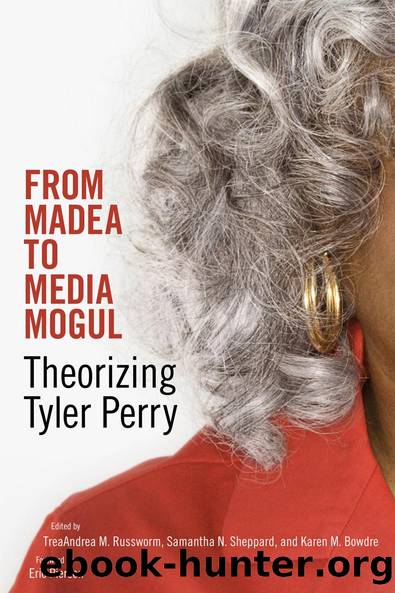From Madea to Media Mogul by unknow

Author:unknow
Language: eng
Format: epub
Tags: Nonfiction, Entertainment, Film, History & Criticism, Performing Arts, Social & Cultural Studies, Social Science
ISBN: 9781496807052
Publisher: University Press of Mississippi
Published: 2016-06-20T04:00:00+00:00
A lot of the stuff, the comedic moments, for me they happen in the moment and, sometimes they just pop into my head and Iâll just say it . . . Yeah, when I go into one of those moments and I start thinking about all of those scenes they come in my brain one by one. It was pretty strange for me to recall [the scene from Good Times] at that moment.48
These sequences exemplify the contradictory, un-reconcilable, and possibly semi-conscious post-traumatic affects that intertwine throughout Perryâs cinephilia, and his archive of feelings.
Perryâs tendency to take on multiple contradictory roles in his enactment of cinephilic jouissance becomes even more pronounced in his introduction to the 2006 Black Movie Awards, titled âGreat Moments in Black Cinema.â In this sequence, Perry painstakingly recreates the mise-en-scéne, dialogue, and performances of Whatâs Love Got to Do with It, Waiting to Exhale, Lady Sings the Blues, and The Color Purple. Perry, in male drag, plays all of the filmsâ leading-man roles, while Perry, as Madea, plays their leading women. He portrays Ike and Tina Turner, Sofia and Celie, Louis Kay and Billie Holiday, and Gloria Matthews (the character originally played by Loretta Devine in Waiting to Exhale) and Marvin King (Gregory Hines). In Perryâs cinephilic re-enactments, the paradoxical combination of diva worship and identification, parody, feminism, anti-feminism, empowerment, victimhood, and perpetration that seems to manifest itself in all of his work becomes literalized to a bizarre extent. Perry pays adoring tribute to filmic female survivors of abuse, embodies them, and makes fun of them. He situates himself as the abuser of women, the rescuer of women, and the victimized women themselves. He plays both feminist and oppressive patriarch. In these moments, the films that have influenced Tyler Perry, his own films and plays, and his discourse about his personal lifeâall of which seem to have helped him to process his personal traumasâbecome superimposed on one another. Their highly contradictory affects and ideologies become inseparable.
Perryâs canon of âGreat Moments in Black Cinemaâ is composed almost entirely of films about Black female abuse survivors. His cinephilic recreations raise questions about Perryâs (and, indeed, our broader cultureâs) relationship to media representations of abuse. Why, for example, were similarly seminal films about Black male abuse survivors like Sweet Sweetbackâs Badasssss Song (Melvin Van Peebles, 1971) and Antwone Fisher (Denzel Washington, 2002) excluded from the list of âgreat momentsâ? The most obvious answer seems to be that those movies (particularly the latter) leave no room for the beloved Madea. However, the question raises a more troubling issue that runs through Perryâs work. In spite of Perryâs outspokenness about abuse against males, and his admitted admiration for Antwone Fisher, he only conveys (and connects) his trauma and his cinephilia in his work by representing the abuse of women.49 This, perhaps, draws attention to his knowledge about the kinds of on-screen abuse that consumers in the industrial marketplace, and American culture as a whole, can tolerate. It also suggests the difficulties that
Download
This site does not store any files on its server. We only index and link to content provided by other sites. Please contact the content providers to delete copyright contents if any and email us, we'll remove relevant links or contents immediately.
How to Be a Bawse: A Guide to Conquering Life by Lilly Singh(6693)
Deep Work by Cal Newport(5465)
The Longevity Diet by Valter Longo(4445)
The Fat Loss Plan by Joe Wicks(4239)
The Four-Pack Revolution by Chael Sonnen & Ryan Parsons(3484)
The Ultimate Bodybuilding Cookbook by Kendall Lou Schmidt(3320)
The French Women Don't Get Fat Cookbook by Mireille Guiliano(2984)
Super Food Family Classics by Jamie Oliver(2912)
Turn Up Your Fat Burn! by Alyssa Shaffer(2811)
Factfulness_Ten Reasons We're Wrong About the World_and Why Things Are Better Than You Think by Hans Rosling(2754)
Not a Diet Book by James Smith(2726)
Tom Kerridge's Dopamine Diet: My low-carb, stay-happy way to lose weight by Kerridge Tom(2676)
Body Love by Kelly LeVeque(2630)
Self-Esteem by Matthew McKay & Patrick Fanning(2603)
The Unbecoming of Mara Dyer by Michelle Hodkin(2483)
Tone Your Tummy Type by Denise Austin(2368)
The Fat Chance Cookbook by Robert H. Lustig(2321)
LL Cool J's Platinum 360 Diet and Lifestyle by LL Cool J(2313)
Men's Health Best by Men's Health Magazine(2092)
